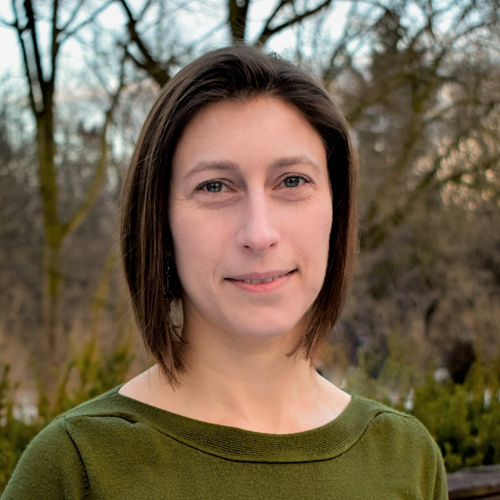
The Argonne National Laboratory Physical Sciences and Engineering (PSE) directorate announced the selection of Elina Kasman of the X-ray Science Division at the U.S. Department of Energy's (DOE's) Advanced Photon Source (APS) to participate in the second cohort of PSE Next Generation of Leaders (NextGen Leaders). This cohort includes two focus areas: Quantum Information Science (QIS) and Science Innovations for a Circular Economy. Also selected was Dafei Jin, Nanoscience Scientist at the Center for Nanoscale Materials (CNM). Both the APS and CNM are Office of Science user facilities at Argonne.
The goal of PSE NextGen Leaders is to provide the next generation of leaders with the tools and skills needed to coordinate research activities across the Lab's multidisciplinary directorates and to build strategic programs. The program is designed to provide early- to mid-career staff across the Laboratory with opportunities to develop themselves and grow new strategic research directions that will result in innovations that impact future technologies and the nation.
“We’re finding creative ways to enable our scientists to support research that addresses our nation’s challenges and advances the frontiers of science and technology,” said Kawtar Hafidi, PSE associate laboratory director. “We believe that bringing together the brightest minds and ideas from across disciplines drives discovery and ensures Argonne’s scientific leadership.”
Kasman, an x-ray optics fabrication engineer in the X-ray Science Division Optics Group in the Photon Sciences Directorate, has begun her two-year participation in the program. She will concentrate her program development efforts on Science Innovations for a Circular Economy under program lead Cynthia Jenks, director of PSE’s Chemical Sciences and Engineering division.
“I am excited and honored to begin the program and help drive this emerging initiative,” said Kasman. “Argonne is in a great position to accelerate science for a circular economy by developing research activities across divisions and directorates and building partnerships with academic and industrial institutions.”
Technical areas relevant to the project include CO2 capture and conversion, quantum materials, microelectronic heterostructures, and plastics.
“This PSE NextGen Leaders program will include efforts tied to Science Innovations for a Circular Economy, an emerging Argonne initiative,” said Jenks. “Elina’s expertise in X-ray optics fabrication and experience at the APS will provide a unique perspective to the position, and her motivation and broad background will allow her to take full advantage of this opportunity.”
Jin works as a nanoscientist in Nanoscience and Technology, performing quantum research at the Center for Nanoscale Materials (CNM). Jin will focus his efforts in the two-year NextGen Leaders program on QIS under program lead Salman Habib, director of Computational Science.
“Through the NextGen program, I’ll be advancing our work in quantum research and development,” said Jin. “This is a wonderful opportunity to connect with other researchers across the lab and to foster collaboration within various research initiatives related to QIS.”
The NextGen program focus in QIS will center on activities connected to the Argonne Quantum Initiative (AQI), which is advancing a research and development program that aligns with the long-term interests of the U.S. DOE's Office of Science and is based on core Argonne capabilities.
“The program will focus on the AQI, and it will be synergistic with Argonne's initiatives in Future Computing, Hard X-ray Sciences, and the Universe as Our Laboratory,” said Habib. “Dafei’s strong background in quantum physics and nano engineering will significantly benefit the lab as a whole, particularly in the strategic directions of quantum sensing, simulation, and networking.”
The program will leverage capabilities at the APS, CNM, and the Argonne Leadership Computing Facility, all DOE Office of Science User Facilities.
The PSE NextGen Leaders program began in FY20 with a pilot focused on energy storage through the Argonne Collaborative Center for Energy Storage Science.
Source: Argonne National Laboratory
The Center for Nanoscale Materials, an Office of Science user facility, was supported by the U.S. Department of Energy (DOE) Office of Science-Basic Energy Sciences, under Contract No. DE-AC02-06CH11357. The Advanced Photon Source, a U.S. DOE Office of Science User Facility operated for the DOE Office of Science by Argonne National Laboratory under contract no. DE-AC02-06CH11357.
The U.S. Department of Energy's APS is one of the world’s most productive x-ray light source facilities. Each year, the APS provides high-brightness x-ray beams to a diverse community of more than 5,000 researchers in materials science, chemistry, condensed matter physics, the life and environmental sciences, and applied research. Researchers using the APS produce over 2,000 publications each year detailing impactful discoveries, and solve more vital biological protein structures than users of any other x-ray light source research facility. APS x-rays are ideally suited for explorations of materials and biological structures; elemental distribution; chemical, magnetic, electronic states; and a wide range of technologically important engineering systems from batteries to fuel injector sprays, all of which are the foundations of our nation’s economic, technological, and physical well-being.
Argonne National Laboratory seeks solutions to pressing national problems in science and technology. The nation's first national laboratory, Argonne conducts leading-edge basic and applied scientific research in virtually every scientific discipline. Argonne researchers work closely with researchers from hundreds of companies, universities, and federal, state and municipal agencies to help them solve their specific problems, advance America's scientific leadership and prepare the nation for a better future. With employees from more than 60 nations, Argonne is managed by UChicago Argonne, LLC, for the U.S. DOE Office of Science.
The U.S. Department of Energy's Office of Science is the single largest supporter of basic research in the physical sciences in the United States and is working to address some of the most pressing challenges of our time. For more information, visit the Office of Science website.
